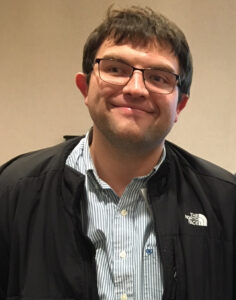Autism, and helping those on the spectrum, has always been an important part of Mark Tapia’s life. He even plans on making it an integral part of his career. In May 2018, Mark graduated from the University of Missouri with a master’s degree in special education with an emphasis in autism spectrum disorders.
As a part of his education and training at Mizzou, Mark spent time working at the Thompson Center, specifically in an internship with the Training in Interdisciplinary Partnerships and Services (TIPS) for Kids program, which is housed within the Thompson Center. The TIPS program allows Mizzou graduate students from various disciplines to collaborate with each other to learn about working with children and people with special needs.
“TIPS helped me recognize the importance of listening to multiple perspectives from many disciplines, collaborating together to meet desired outcomes in the form of diagnoses, and ultimately knowing that our work is never done,” Tapia said. “We are all on a mission to improve the lives of individuals on the spectrum and their families.”
Mark’s passion for his mission to help improve the lives of individuals on the spectrum and their families comes from a very personal place. Mark was diagnosed with autism at a young age and has spent his life training to help others who share that same path.
As a member of the TIPS program at the Thompson Center, Mark served an important role as an autism self advocate. He was able to provide insight to the other students about how people on the spectrum may feel or react to certain treatment methods.
“Mark’s input was invaluable, not only as a self advocate, but as a fellow student peer of the other students training to work with children with special needs,” said Dr. Connie Brooks, director of TIPS and psychologist at the Thompson Center. “The insight he offered, as well as his passion for helping people with special needs, makes it obvious that he is destined to help many people throughout his career.”
After graduating with his master’s degree from Mizzou, Mark was accepted into the special education department at the University of Texas, where he will pursue a doctorate in special education. His ultimate career goal is to work with adolescents and adults on the spectrum during their transitions from secondary to postsecondary education. A transition that often can bring challenges, as Mark himself has experienced.
“Personally, I was able to pursue gradual transitions throughout my postsecondary education,” Mark said. “I lived at home with my parents in St. Louis while earning my undergraduate degree. I then moved in with my sister in Columbia for two years while earning my master’s degree, and now I will be living on my own in Austin while I work on my PhD.”
While this gradual transition toward independent living has worked well for Mark, he says that transitional challenges can vary based on the individual.
“Challenges will vary from individual to individual,” Mark said. “However, I would say social difficulties can be the most challenging, as well as understanding changes with puberty for adolescents on the spectrum.”
Mark hopes that his continued education at the University of Texas will further prepare him for working with these adolescents and helping guide their own paths to postsecondary success, just as Mark has earned himself.


